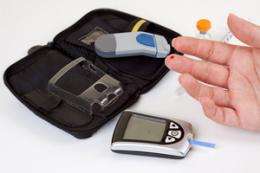Trusting their doctor helps people manage diabetes

For people with diabetes, a good relationship with a physician is key to sticking to a treatment plan that can help avoid serious complications. New research in the American Journal of Health Behavior, however, suggests more work may be needed to improve many of these doctor–patient relationships.
Part of diabetes management includes following a self-care regimen including exercise, blood glucose monitoring, and taking medication. Research has shown that this is more likely to happen when patients trust their physicians and have good communication about their routines.
For the study, researchers from Wake Forest School of Medicine in Winston-Salem, NC, surveyed 563 adults over age 60 with diabetes to assess which patients from various demographic groups and health characteristics had the most trust in their physicians.
Participants were from rural counties in North Carolina and were White, African American and American Indian. They completed in-home surveys about their diabetes management, such as how often they exercised, had dilated eye exams or did self-feet checks, and completed the 11-item General Trust in Physician Scale.
Patients over age 75 had higher trust in their physicians with an average score of 36 compared to the younger participants' 34.1. Those with fewer than three chronic health conditions also scored higher in trust than those with more health problems (35.2 vs. 33.1).
"We were somewhat surprised that trust was higher among older adults, but lower among those with three or more chronic health conditions, since chronic health conditions would be more common in older adults and would require greater interaction with physicians," responded lead author Ronny Bell, Ph.D., of the department of epidemiology and prevention.
People who followed the recommended physical exercise and dilated eye exam guidelines reported more trust in their physicians compared to those who did not. Other demographic categories had no significant difference.
Overall, the average trust score was 34.6. Given that the maximum score was 55, it's probably indicative of there being some degree of distrust in this population, said Bell.
The authors were unsure why some groups had more trust in their physicians than the others, but concluded that efforts should be made to build trust in the patient–provider relationship to enhance all patient outcomes.
Robert A. Gabbay, M.D., Ph.D., senior vice president and chief medical officer at the Joslin Diabetes Center in Boston, said a provider's communication style can make a big difference in establishing a trusting relationship.
"Specifically, the provider can be directive, telling the patient what to do without listening to them, or be a guide for the patient to help them achieve what is important in their lives," Gabbay explained. "Listening to the patient about what are potential barriers is critical for us as providers to help them problem solve."
More information: Bell RA, Arcury TA, et al. Correlates of physician trust among rural older adults with diabetes, Am J Health Behav., 2013.















